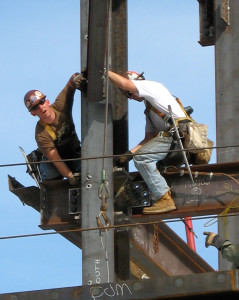How to secure attorney’s fees on a contractor’s bond
 Whenever you find yourself dealing with a contractor, you will also find yourself dealing with that contractor’s bond almost without exception. Under Washington statute Title 18, general contractors and subcontractors alike are required to file evidence of a surety bond with the Department of Labor and Industries of Washington State. RCW 18.27.040 (general contractor bond must be in the amount of $12,000 and a subcontractor or “specialty” contractor bond must be in the amount of $6,000). The statute’s purpose is “to afford protection to the public including all persons, firms and corporations furnishing labor, materials, or equipment to a contractor from unreliable, fraudulent, financially irresponsible, or incompetent contractors.” RCW 18.27.140. It is a misdemeanor for a contractor to work without first being registered pursuant to the statute. RCW 18.27.020(2)(a).
Whenever you find yourself dealing with a contractor, you will also find yourself dealing with that contractor’s bond almost without exception. Under Washington statute Title 18, general contractors and subcontractors alike are required to file evidence of a surety bond with the Department of Labor and Industries of Washington State. RCW 18.27.040 (general contractor bond must be in the amount of $12,000 and a subcontractor or “specialty” contractor bond must be in the amount of $6,000). The statute’s purpose is “to afford protection to the public including all persons, firms and corporations furnishing labor, materials, or equipment to a contractor from unreliable, fraudulent, financially irresponsible, or incompetent contractors.” RCW 18.27.140. It is a misdemeanor for a contractor to work without first being registered pursuant to the statute. RCW 18.27.020(2)(a).
The mandatory contractor’s bond requirement is important to potential litigants because any person who may file a claim against the contractor is also permitted to specifically name the surety bond as a party to the suit. Of course, naming the bond involves particular pleading requirements in order to comply with the statute. When done right this statute can secure you an increasingly rare award as part of the recovery: YOUR ATTORNEYS’ FEES!! See RCW 18.27.040(6). Such statutes are quite in the opposite of the general rule that each party in a civil action is responsible for paying its own attorneys’ fees and costs. In re Impoundment of Chevrolet Truck, 148 Wn.2d 145, 160, 60 P.3d 53 (2002) (commonly referred to as the “American rule”). In an effort to put some teeth in the statute, Washington legislators expressly included that attorneys’ fees were a possible award to bona fide litigants.
However, the statute has been subject to some scrutiny in recent caselaw from several levels of the State’s judiciary in recent months. The contractor’s registration statute was thoroughly examined in Cosmopolitan Engin. Group, Inc. v. Ondeo Degremont, Inc., 159 Wn.2d 292, 149 P.3d 666 (2006). In that case, one litigant claimed that the contractor’s bond statute allowed the prevailing party to recover its attorneys’ fees from both the contractor and the surety bond itself. Id. at 298. In undertaking its statutory interpretation of RCW 18.27.040, the Court deduced that the placement of the attorneys’ fee provision, when considering the statutory scheme in its entirety, refers “only to action for recovery against the contractor’s bond. Id. at 299. Hence, the Court limited recovery of attorneys’ fees under this section to the amount of the contractor’s bond due to its precise placement in the contractor’s bond statute. In apparent dicta, the Court further rationalized its decision based on the legislatures’ failure to expressly identify that attorneys’ fees were available in suit “against the contractor or against the contractor’s bond” independently of one another. Id. at 301. The court’s reasoning makes sense due to the fact that a litigant could not sue a contractor’s bond under the statute without first initiating a claim against the contractor for breach of contract. The Cosmopolitan decision and its authority for limiting an attorney fee award specifically to the amount of the bond was reaffirmed as recently as last December in an appellate decision from Division Three. See Brotherton v. Kralman Steel Structures, Inc., 2011 WL 6822261, *5-9 (Div. 3 2011). Thus, the prospect of pursuing fees from the contractor party seems to be quite settled without much room to argue the alternative.
Cosmopolitan also explained that RCW 18.27.040 is a one-way statute. Id. at 302, n.3. What is meant by “one-way” is that a subcontractor can sue up the chain and recover against the upper tier contractor’s bond, but not vice versa. Id. Such a dynamic allows suppliers to recover against bond rather than resorting to placing a lien on the consumer’s property for a dispute that does not necessarily involve the homeowner at all. Id. (citing Int’l Comm. Collectors, Inc. v. Carver, 99 Wn.2d 302, 308, 661 P.2d 976 (1983); Stewart Carpet Serv., Inc. v. Contractors Bonding & Ins. Co., 105 Wn. 2d 353, 365-66, 715 P.2d 115 (1986)).
Photo Credit: scottchan


 The contract owner in MMJ at almost every turn notified (often in writing) the contractor that if it wanted additional consideration for changes in the contract, it must satisfy the requirements for change orders and turn in specific documentation and information to the owner. MMJ failed to do so. The court held that even though the contract owner had actual knowledge of the changed circumstances, this wasn’t enough. It would have to do more to waive other than simply having actual notice of the changes.
The contract owner in MMJ at almost every turn notified (often in writing) the contractor that if it wanted additional consideration for changes in the contract, it must satisfy the requirements for change orders and turn in specific documentation and information to the owner. MMJ failed to do so. The court held that even though the contract owner had actual knowledge of the changed circumstances, this wasn’t enough. It would have to do more to waive other than simply having actual notice of the changes. “MMJ argued to the Court of Appeals, and maintains before this court, that when an owner has actual notice of a contractor’s protest or claim, that notice, in and of itself, excuses the contractor from complying with mandatory contractual protest and claim procedures. MMJ contends that the decision of Bignold v. King County, 65 Wn.2d 817, 822, 399 P.2d 611 (1965) establishes the ‘actual notice’ exception . . . [c]ontrary to MMJ’s contention, the Court of Appeals in Bignold did not hold that the owner’s actual notice of the changed condition in and of itself excused the contractor from complying with the contractual notice provisions. Rather it was the owner’s knowledge of the changed conditions coupled with the subsequent direction to proceed with the extra work that evidenced its intent to waive enforcement of the written notice requirements under the contract.” Id. at 388-89
“MMJ argued to the Court of Appeals, and maintains before this court, that when an owner has actual notice of a contractor’s protest or claim, that notice, in and of itself, excuses the contractor from complying with mandatory contractual protest and claim procedures. MMJ contends that the decision of Bignold v. King County, 65 Wn.2d 817, 822, 399 P.2d 611 (1965) establishes the ‘actual notice’ exception . . . [c]ontrary to MMJ’s contention, the Court of Appeals in Bignold did not hold that the owner’s actual notice of the changed condition in and of itself excused the contractor from complying with the contractual notice provisions. Rather it was the owner’s knowledge of the changed conditions coupled with the subsequent direction to proceed with the extra work that evidenced its intent to waive enforcement of the written notice requirements under the contract.” Id. at 388-89